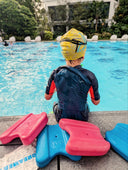Welcome to Dreamer Swim Club
"Help! My Child Suddenly Hates Their Swimming Lesson." - A Coach's Guide for Parents

It’s a situation that plays out at poolsides across Singapore every week. Your child, who used to be excited about their swimming lesson, suddenly puts up a fight. There might be tears, tantrums, or a stubborn refusal to even put on their swimsuit. As a parent, it can be frustrating, worrying, and deeply confusing. Your first thoughts might be, "Is it the coach? Did something happen? Will they ever learn to swim?"
Before you consider giving up, we want to reassure you of two things. First, this is an incredibly common phase. Second, it is almost always temporary. A sudden resistance to swimming lessons is rarely about the swimming itself. It's a symptom of an underlying issue, and our job, as coaches and parents working together, is to become gentle detectives to figure out what's really going on.
At Dreamers, we believe that forcing a fearful or resistant child into the water is the fastest way to extinguish their love for it. This guide is designed to walk you through the common causes of this sudden change and provide a practical, compassionate action plan to help your child rediscover their joy in the pool.
Part 1: Let's Be Detectives - The Common "Whys"
A child, especially a young one, often can't articulate the root cause of their feelings. "I hate swimming" is just the easiest way to express a more complex emotion. Here are the most common culprits we see.
1. They've Entered a Developmental "Fear Period" This is particularly common in toddlers and preschoolers (ages 2-5). It’s a completely normal developmental stage where a child's brain is rapidly developing, and they can suddenly become afraid of things that never bothered them before—the vacuum cleaner, the dark, or the sound of the pool drain. It’s not a rational fear; it’s a phase of cognitive growth, and it will pass.
2. They Had a Minor "Bad" Experience A child’s sense of security in the water is fragile. A single, seemingly minor event can create a powerful negative association. Did they accidentally swallow a mouthful of water? Were they colder than usual during the last lesson? Did a loud splash from another child startle them? Even if it seemed insignificant to you, it can be a big deal for them.
3. They're Hitting a Learning Plateau In the beginning, progress is fast and exciting. But learning any skill involves plateaus. When a child is working on a more difficult skill—like rhythmic breathing or a complex coordination drill—and isn't seeing immediate success, it can become frustrating. "I hate this" is often a child's way of saying, "This is hard, and I feel like I'm failing."
4. It's a Battle for Control Especially for toddlers, the word "no" is a powerful tool for asserting their independence. The battle might have nothing to do with the water. It could be about wanting to choose their own swimsuit, not wanting to leave a fun activity at home, or simply testing their boundaries. The swimming lesson becomes the stage for a power struggle that isn't actually about swimming.
Part 2: Your Action Plan - A Coach's Advice
Once you have a better idea of the potential "why," you can take steps to resolve it. The key is a patient, united front between you and your coach.
1. Acknowledge Their Feeling (Don't Dismiss It) The most important first step is to validate their emotion. Instead of saying, "Don't be silly, you love swimming," try, "I can see you're feeling really upset about the lesson today. Can you tell me more about it?" This shows you are on their side and opens the door for a real conversation.
2. Be a Partner with Your Coach Please, always talk to your coach! Arrive five minutes early and give them a quick heads-up: "Hey, just so you know, Leo has been really resistant to coming today. He might need a little extra warm-up time." This allows the coach to adapt the lesson plan immediately. They can start with his favorite games or focus entirely on play to rebuild that positive connection. A great coach is your number one ally.
3. Re-introduce "Fun" Water Time Separate the idea of "lessons" from the idea of "fun in the water." During the week, take your child to the pool or a splash park with zero agenda. No drills, no instruction. Just pure, unstructured fun. Bring fun floating toys. Let them lead the play. The goal is to rebuild the association between water and joy, without the pressure of a formal lesson.
4. Never, Ever Force It Turning a lesson into a power struggle is a battle you will always lose in the long run. Forcing a crying, fearful child into the water will only deepen their anxiety and can cause real, lasting trauma. It is always better to cancel a lesson, take a step back, and protect their long-term relationship with the water.
Our Commitment to Your Child
At Dreamers, this is where our "Circle of Care" philosophy comes to life. If a child is having a tough day, our swimming coaches are trained to immediately pivot. We will abandon the lesson plan and focus entirely on trust and games. We will go back to basics, celebrate the smallest moments of bravery, and ensure the session ends on a positive, happy note. We are playing the long game, and your child's emotional well-being is always our top priority.
